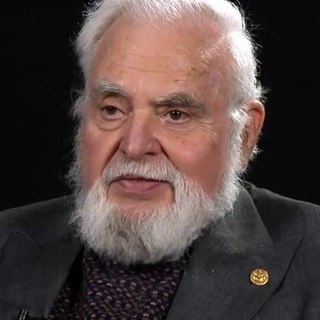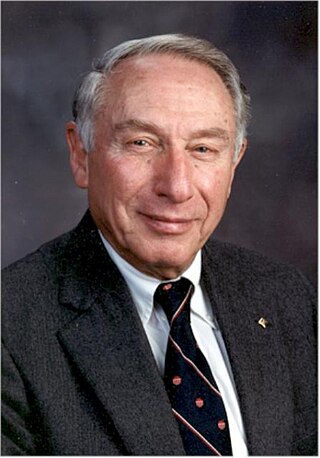
The Institute of Radio Engineers (IRE) was a professional organization which existed from 1912 until December 31, 1962. On January 1, 1963, it merged with the American Institute of Electrical Engineers (AIEE) to form the Institute of Electrical and Electronics Engineers (IEEE).

Solomon Wolf Golomb was an American mathematician, engineer, and professor of electrical engineering at the University of Southern California, best known for his works on mathematical games. Most notably, he invented Cheskers in 1948. He also fully described polyominoes and pentominoes in 1953. He specialized in problems of combinatorial analysis, number theory, coding theory, and communications. Pentomino boardgames, based on his work, would go on to inspire Tetris.
Ashok Jhunjhunwala is an Indian academic and innovator. He received his B.Tech. from the Indian Institute of Technology, Kanpur and PhD from the University of Maine. He has been a faculty member at the Indian Institute of Technology Madras since 1981. He is the President of IIT Madras Research Park and Chairman of International Institute of Information Technology, Hyderabad. During his career, he has contributed extensively to technology innovation and adoption in the Indian context.

Francis Patrick Kelly, CBE, FRS is Professor of the Mathematics of Systems at the Statistical Laboratory, University of Cambridge. He served as Master of Christ's College, Cambridge from 2006 to 2016.

Floyd Dunn was an American electrical engineer who made contributions to all aspects of the interaction of ultrasound and biological media. Dunn was a member of Scientific Committee 66 of the National Council on Radiation Protection and Measurements as well as many FDA, NIH, AIUM, and ASA committees. He collaborated with scientists in the UK, Japan, China and Post-Soviet states.
Joel Stanley Engel is an American electrical engineer who made fundamental contributions to the development of cellular networks.
Heung-Yeung "Harry" Shum is a Chinese computer scientist. He was a doctoral student of Raj Reddy. He was the Executive Vice President of Artificial Intelligence & Research at Microsoft. He is known for his research on computer vision and computer graphics, and for the development of the search engine Bing.

Richard H. Frenkiel is an American engineer, known for his significant role in the early development of cellular telephone networks.
Jayant R. Haritsa is an Indian computer scientist and professor. He is on the faculty of the CDS and CSA departments at Indian Institute of Science, Bangalore, India. He works on the design and analysis of Database Systems. In 2009 he won the Shanti Swarup Bhatnagar Prize sponsored by CSIR, India. In 2014 he won the Infosys Prize for Engineering.

Harold Vincent Poor FRS FREng is the Michael Henry Strater University Professor of Electrical Engineering at Princeton University, where he is also the Interim Dean of the School of Engineering and Applied Science. He is a specialist in wireless telecommunications, signal processing and information theory. He has received many honorary degrees and election to national academies. He was also President of IEEE Information Theory Society (1990). He is on the board of directors of the IEEE Foundation.
V Ramgopal Rao is an Indian academic currently serving as the Group Vice Chancellor of Birla Institute of Technology and Science, Pilani for campuses located in Pilani, Dubai, Goa, Hyderabad and Mumbai. He was previously the Director of IIT, Delhi for six years during 2016-2021.
Sanghamitra Bandyopadhyay is an Indian scientist specializing in computational biology. A professor at the Indian Statistical Institute, Kolkata, she is a Shanti Swarup Bhatnagar Prize winner in Engineering Science for 2010, IInfosys Prize 2017 laureate in the Engineering and Computer Science category and TWAS Prize winner for Engineering Sciences in 2018. Her research is mainly in the areas of evolutionary computation, pattern recognition, machine learning and bioinformatics. Since 1 August 2015, she has been the Director of the Indian Statistical Institute, and she would oversee the functioning of all five centres of Indian Statistical Institute located at Kolkata, Bangalore, Delhi, Chennai, and Tezpur besides several other Statistical Quality Control & Operation Research Units spread across India. She is the first woman Director of the Indian Statistical Institute. Currently she is on the Prime Ministers' Science, Technology and Innovation Advisory Council. In 2022 she was given the Padma Shri award for Science and Engineering by the Government of India.
Tamara Macushla Munzner is an American-Canadian scientist. She is an expert in information visualization who works as a professor of computer science at the University of British Columbia (UBC).
John N. Tsitsiklis is a Clarence J. Lebel Professor of Electrical Engineering with the Department of Electrical Engineering and Computer Science (EECS) at the Massachusetts Institute of Technology. He serves as the director of the Laboratory for Information and Decision Systems and is affiliated with the Institute for Data, Systems, and Society (IDSS), the Statistics and Data Science Center and the MIT Operations Research Center.
Vivek Shripad Borkar is an Indian electrical engineer, mathematician and an Institute chair professor at the Indian Institute of Technology, Mumbai. He is known for introducing analytical paradigm in stochastic optimal control processes and is an elected fellow of all the three major Indian science academies viz. the Indian Academy of Sciences, Indian National Science Academy and the National Academy of Sciences, India. He also holds elected fellowships of The World Academy of Sciences, Institute of Electrical and Electronics Engineers, Indian National Academy of Engineering and the American Mathematical Society. The Council of Scientific and Industrial Research, the apex agency of the Government of India for scientific research, awarded him the Shanti Swarup Bhatnagar Prize for Science and Technology, one of the highest Indian science awards for his contributions to Engineering Sciences in 1992. He received the TWAS Prize of the World Academy of Sciences in 2009.
Ranjan Kumar Mallik is an Indian electrical and communications engineer and a professor at the Department of Electrical Engineering of the Indian Institute of Technology, Delhi. He held the Jai Gupta Chair at IIT Delhi from 2007 to 2012 and the Brigadier Bhopinder Singh Chair from 2012 to 2017. He is known for his researches on multiple-input multi-output systems and is an elected fellow of all the three major Indian science academies viz. Indian Academy of Sciences, Indian National Science Academy, and The National Academy of Sciences, India. He is also an elected fellow of The World Academy of Sciences, Indian National Academy of Engineering, and The Institute of Electrical and Electronics Engineers, Inc.
Yendluri Shanthi Pavan is an Indian electrical engineer and a professor at the Department of Electrical Engineering of the Indian Institute of Technology, Madras. He is known for his studies on mixed signal VLSI circuits and is an elected fellow of the Indian National Academy of Engineering. He is also a fellow of IEEE. The Council of Scientific and Industrial Research, the apex agency of the Government of India for scientific research, awarded him the Shanti Swarup Bhatnagar Prize for Science and Technology, one of the highest Indian science awards for his contributions to Engineering Sciences in 2012.
Francis "Frank" J. Doyle III is an American engineer and academic administrator. He is a professor of Engineering and provost of Brown University.
As of 2023, the Institute of Electrical and Electronics Engineers (IEEE) has 7,236 members designated Fellow, each of whom is associated with one of the 41 societies under the IEEE.





